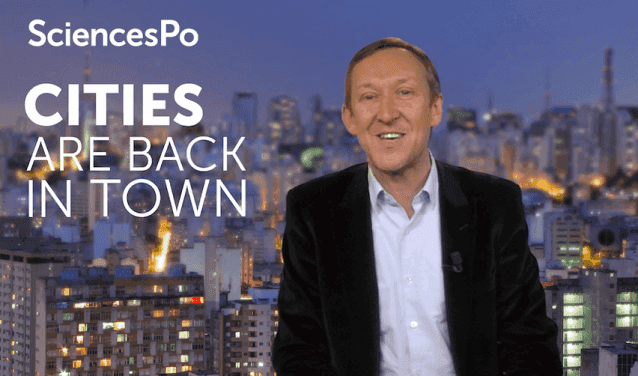Home>MOOC: Cities are back in town

27.03.2020
MOOC: Cities are back in town
Update March 2020: Ideas are not in confinement! All of our MOOCs are available on Coursera, and it is once again possible to take the course "Cities are Back in Town" by Patrick Le Galès, Dean of the Sciences Po Urban School. This MOOC draws on sociology and history for a fresh look at the urban planning of metropolises.
Read this interview to find out more. #KeepLearning
- Who is this MOOC designed for?
Patrick Le Galès: This MOOC is primarily for students, particularly third-year students and first-year Master’s students. The idea – and the challenge – is to attract students from all over the world. We have made a very promising start, with more than *7,000 people registered already and students from every continent. In order to interest the most diverse community of students possible, we have made a big effort to use examples from a variety of countries and cultures, and research from other countries besides Europe and the United States.
- Could it also interest professionals?
Patrick Le Galès: Yes, it could be useful for urban planning professionals who want to understand contemporary developments in urban sociology and gain some tools for analysing them. I think the MOOC may also be of some interest to academics because of its strong comparative angle, which contrasts with the very Euro-centred or America-centred tradition in urban sociology. The course could be useful for teachers because of the variety of examples it gives.
- What are the learning objectives of the eight sessions?
PLG: The editorial line is very clear. In urban studies, there is a strong trend towards research into urbanisation processes, with highly abstract theoretical analysis. Another trend involves a lot of detailed analysis of one particular neighbourhood or slum or district. Both are interesting, but the MOOC takes a different approach. We are going to compare intellectual models in order to understand what is going on in urbanisation processes all over the world. We will draw on sociology, history, and comparison to develop theoretical and analytical tools that apply to cities and metropolises today.
- What is the content of each session?
PLG: In each session of the course, we choose a particular theme or type of city – post-colonial cities, European cities or smart cities for example. We study the historical conditions that led to the emergence of this category, and the analytical model that has been developed to understand this particular urban form. Then, we extract this model from its original context and try to use it to understand current urban developments. For instance, the model of the Marxist industrial city arose in 19th-century Manchester, but it can be adapted to analyse and understand modern-day Sao Paulo (Brazil) or Dacca (Bangladesh). A city like Los Angeles takes its form from two different paradigms at once: the industrial model and the European one.
- Why did you choose to release all the sessions of the course at the same time?
PLG: Because experience told us that MOOC students have very varied needs. Some of them want to follow the logical pattern and study all the lessons in a row, while others prefer to pick and choose the themes they are most interested in. Releasing all the content at the same time is best way to give learners all the options. It is also a huge challenge for the professor!
- What do you find most challenging about this MOOC in terms of teaching?
PLG: I find this MOOC experience both fascinating and terrifying! When you want to address people from all over the world, you have to make an enormous effort to provide a variety of examples and models and avoid a Eurocentric or American-centric perspective. And you never know if you have succeeded because you don’t know who is attending the class! It is also particularly demanding, because if you want to talk about Lagos, you have to be perfectly accurate and up-to-date, as some of your virtual students may be from Nigeria and know the area better than you do. The heavy use of visual resources (videos, photography, infography) also represents more work because you have to connect with these images; it is a very different type of writing.
- Are you looking forward to discussions with your students on the post-session forums ?
PLG: Of course! I am very excited by this whole experiment, and impatient to see the student’s reactions, because the content we are offering is truly original. There is no textbook on the subject and I have never taught this course to students in a classroom. I am convinced it is a very edgy approach for urban studies, as the field is quickly moving to a global comparative approach and yet few people are able to provide it. That’s what we are trying to do with this MOOC. If we succeed, the students will be part of a major shift in urban sociology.
This interview is from September 2015. In 2020, over 17,000 students have taken the MOOC "Cities are Back in Town" on Coursera.
Related links